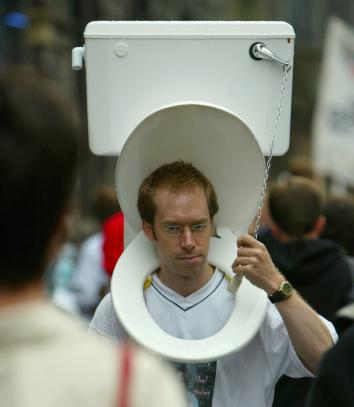I confess, I’ve tweeted from the toilet. I’ve flitted through Facebook. And, though I hate to out myself, I’ve churned through the never-ending tide of email that washes into my inbox.
Why? I suppose the question is really, why not? My iPhone is small, handy, portable, kind of addictive, and closer than the stack of newspapers in the recycling bin. But truthfully, I’ve never really given it much thought before. And, like my friend and New America colleague Katherine Mangu-Ward noted earlier in her defense of texting on the toilet, it’s not like I’m the only one. A 2012 marketing survey, “IT in the Toilet,” found that about three-fourths of the 1,000 men and women they polled admitted to using their smartphones on the commode. An earlier survey reported that 38 million Americans use their phones to shop on the pot.
Enough!
Americans already work among the longest and most extreme hours of any advanced economy, not counting the cloaked hours on call on our gadgets at all hours and all places. And though we like to think that makes us productive and efficient—and important—it doesn’t. Other countries, with shorter work hours, higher wages, generous paid sick and family leave and as much as a month of paid vacation every year are actually as productive per hour (France), or more (Norway), than the United States, according to annual charts of GDP per hours worked put out by the Organization for Economic Cooperation and Development and Bureau of Labor Statistics.
And at a time when we need to be more creative and innovative—I think the word du jour is disruptive—as the very technology we take into the toilet remakes our economies and societies, working everywhere, all the time, at all hours, at the desk, in the car, distractedly walking down the street or sneaking off to the restroom stall, is exactly the wrong thing to do.
Why? Because neuroscience is discovering that our brains are wired for new ideas, breakthrough thinking, and inspiration to arise in a break from the constant grind of work. In the pauses, at the least expected times, often when we’re doodling, daydreaming or even mindlessly perusing the goofy toilet trivia, the back of a shampoo bottle, or the colorful graffiti scribbled all over the bathroom walls, the a-ha moment alights.
We’re calm and relaxed. Our brains are idle. And something lights up called the Default Mode Network, which, like airport hubs, connect different parts of our brain that typically don’t communicate. That’s when a stray thought, a random memory, an image, can coalesce into a strange, wonderful and wholly original stew. Author J.K. Rowling stared out a train window for four hours and the entire plot of the Harry Potter series “fell into” her head, she’s said.
The point is, toilet habits have changed as societies have changed. In the ancient world, toilets were often a place for socializing, as high-status men sank their tushes into communal marble toilets with as many as 36 seats. European kings—and famously, LBJ—conducted business on the throne while doing their business, a sign more of their power than their drive to be productive, writes Bob Cromwell, a Linux coder and self-proclaimed Toilet Guru. (He runs a quirky eponymous website on everything you never knew you wanted to know about toilets.)
But never before, he says, have we seen work creep so far into every nook and cranny of our lives, even the privy, as a result of technology.
“I’m always struck, the minute you get out of an airplane, everybody heads to the bathroom and starts making calls and checking their phones. I mean, how urgent are all these calls, really? It’s a quality of life thing, to me,” he said. “Sometimes, when I hear a disembodied voice talking in the stall, I’m happy to say in a really loud voice, ‘He’s talking to you sitting on the toilet!’ I figure I can get away with it. It’s not like they’re going to get up and run after me.”
I can already hear you not listening to me as you distractedly check your Twitter notifications. So this is perhaps a battle lost before it’s even begun. But try an experiment. Next time you feel the urge to go, put your device down, blink as you get used to natural light again, and see what happens when you set your brain—or at least your work-weary soul—free.
